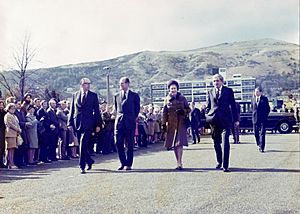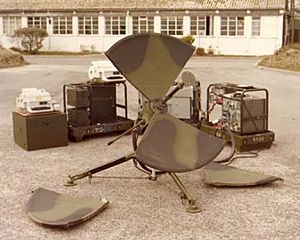Royal Signals and Radar Establishment facts for kids
The Royal Signals and Radar Establishment (RSRE) was a special place where scientists and engineers worked on amazing inventions for the Ministry of Defence (MoD) in the United Kingdom. It was mainly located in Malvern, England. The RSRE had a cool motto: Ubique Sentio. This is Latin for "I sense everywhere," which gives you a clue about some of the clever things they created!
Contents
How RSRE Started
The RSRE was created in 1976. It was formed by joining together several older research groups. Think of it like different puzzle pieces coming together to make one big picture!
These groups included:
- The Royal Radar Establishment (RRE), which had roots in World War II.
- The Signals Research and Development Establishment (SRDE) from Christchurch, Dorset.
- The Services Electronic Research Laboratory (SERL) from Baldock.
Over time, the SRDE and SERL moved to Malvern. This meant all these smart people were working together in one main spot. RSRE also had smaller sites nearby. These included old RAF airfields like Defford and Pershore. They even had a station at Sheriffs Lench to track satellites!
Changes Over Time
In April 1991, RSRE joined with other defense research groups. They formed a new agency called the Defence Research Agency. Then, in April 1995, this agency grew even bigger. It became the Defence Evaluation and Research Agency.
Later, in June 2001, things changed again. Most of this agency became a company called QinetiQ. This company was owned by the Ministry of Defence. The rest of the agency became a government lab called DSTL. In 2003, a company called the Carlyle Group bought a part of QinetiQ.
Amazing Inventions and Discoveries
The scientists at RSRE and its earlier groups invented many important technologies. Some of their most famous creations include:
- Radar: This technology uses radio waves to detect objects.
- Satellite communications: They helped develop ways to send messages using satellites high above Earth.
- Thermography: This is a way to see heat, like in night vision cameras.
- Liquid crystal displays (LCDs): These are the screens you see on phones and TVs!
- Speech synthesis: This is how computers can "talk" and create human-like speech.
- Touchscreens: Yes, they were involved in making touchscreens!
Satellite Work
Before RSRE, the Signals Research and Development Establishment (SRDE) worked on military satellites. They helped with the US Interim Defense Communication Satellite Program. They also worked on Britain's own Skynet 1 and 2 satellites.
Later, the SRDE's satellite work moved to the RSRE site at RAF Defford. This spot was perfect for setting up large satellite dishes. RSRE also helped design and test the Skynet 4 satellites. They worked on the ground stations that communicate with these satellites too.
Computer Science Breakthroughs
RSRE made big contributions to computer science. They developed special computer languages like ALGOL 68RS and Coral 66. They also worked on smart computer networks called radial basis function networks.
They even created a super reliable computer chip called the VIPER microprocessor. This chip was designed to be extremely safe and trustworthy. Another invention was ELLA, a language for designing computer hardware. They also made the TenDRA C/C++ compiler, which helps turn computer code into programs.
Early Internet Connections
RSRE was one of the first places in Europe to research TCP/IP. This is the main set of rules that makes the internet work! They worked alongside other research groups in London and Norway.
Guess what? The very first email sent by a head of state came from RSRE! Queen Elizabeth II sent it on March 26, 1976, using the early internet called ARPANET. RSRE was given a huge section of internet addresses in 1979. This later became the address space for the entire Ministry of Defence.
 | Madam C. J. Walker |
 | Janet Emerson Bashen |
 | Annie Turnbo Malone |
 | Maggie L. Walker |



